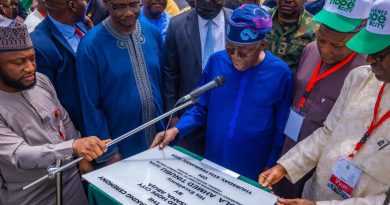War Against Human Trafficking: Fagbemi Calls For Collaboration Of All Stakeholders As NAPTIP Decries Loan-For-Sex Trafficking Schemes
By Bukar BOLORI
“One such disturbing trend is the emergence of loan-for-sex trafficking schemes, where unsuspecting women are deceived through fraudulent online loan offers”
The Minister of Justice and Attorney General of the Federation, Prince Lateef Fagbemi has declared that human trafficking has become a sophisticated, profit-driven, and deeply coordinated criminal enterprise, and could no longer be addressed in isolation, nor tackled by one agency or sector alone.
The Minister made the declaration on Wednesday in Abuja while delivering a keynote address at this year’s World Day Against Trafficking in Persons, with the theme: “Human Trafficking is Organized Crime – End the Exploitation,” and the 28th National Stakeholders’ Consultative Forum on Human Trafficking.
Fagbemi said human trafficking “is no longer a crime that can be addressed in isolation, nor can it be tackled by one agency or sector alone. It requires a united front, reinforced partnerships, and multi-sectoral collaboration.”
The Minister, who was represented by the Director, Research and Project Development, Victoria Ojogbane, said: “To this end, the 2025 observance has been thoughtfully designed to go beyond ceremonial declarations. Experts from relevant Ministries, Departments and Agencies (MDAs), including the Armed forces, law enforcement, justice, social welfare, and international partners, have been carefully selected to serve as Panelists to dissect the theme from their institutional lenses and practical experiences, and with a view to building a more holistic, coordinated, and intelligence-led response to the crime.”
He explained that: “Human trafficking is organized crime and transnational in nature as it is planned; carried out by groups in a structured manner. It is a deeply coordinated criminal enterprise and the primary goal of the perpetrators is economic gain from the exploitation of others irrespective of whom the victim is. Human Traffickers attempt to insulate both their leadership and membership from detection, sanction, and/ or prosecution through their organisational structure. This crime can be local, national or transnational and constitute threats to persons and their families, Communities and nations. In fact, it is affecting our national security negatively as Nigeria is a Source, Transit and Destination country for trafficking.
“As an organised criminal activity with high profit and low risks, Human trafficking is highly sophisticated, profit-driven with annual profit of over $245 billion US Dollars according to the ILO official report of 2023. A breakdown of this indicates US$169.9 Billion for Sexual Exploitation; and US75.9billion from forced labour in the private sector, including domestic servitude.”
The Minister added that: “As we reflect on our progress and chart the way forward, this year’s Anti-Trafficking event stands as a clarion call to action, for policymakers, implementers, communities, and the global community, to intensify efforts, align strategies, and, ultimately, end the exploitation of our people.”
Fagbemi said he was impressed with the operational milestones recorded by NAPTIP from inception to date, with 25,642 victims rescued (of whom 73.8% are females and 48.1% children; arrest of 11,406 suspected traffickers, and 750 convictions (comprising 469 males and 281 females), stressing that: “These strides are worth celebrating, considering the intricacies involved in obtaining a single conviction, in a highly sensitive and clandestine crime such as human trafficking.”
He said: “As we look ahead, let me remind everyone that our current National Action Plan on Human Trafficking in Nigeria will phase out in 2026. We must therefore begin now to think boldly and collaboratively about the development of the next plan. I would like to thank UNODC for already capturing the development of the new National Action Plan in its UNODC Country for Nigeria, and its Vision for Nigeria (2026–2030). This kind of foresight and partnership is exactly what we need to sustain momentum.
“I assure you of Nigeria’s unwavering commitment to stamping out human trafficking in Nigeria—especially by addressing its root causes of poverty, inequality, weak governance, and lack of opportunity. Together, let us resolve not to relent until this organized crime is ended, and every Nigerian—man, woman, and child—is safe from the horror of exploitation.”
Earlier, in her welcome speech, the Director General of NAPTIP, Hajiya Binta Adamu, said: “It is important to draw attention to the alarming and ever-evolving tactics employed by human traffickers today.
“One such disturbing trend is the emergence of loan-for-sex trafficking schemes, where unsuspecting women are deceived through fraudulent online loan offers. These women, often in desperate need of financial assistance, are trapped in cycles of exploitation when they are coerced into prostitution, or other forms of sexual expoitation under the pretext of repaying these non-existent debts. This method preys on economic vulnerability and is facilitated largely through unregulated digital platforms.
“Equally troubling are the proliferation of fake job offers and scholarship scams. Traffickers now masquerade as international employers or academic recruiters, enticing young people with promises of lucrative employment or fully-funded education abroad. Upon arrival in foreign countries, victims are stripped of their freedoms and subjected to forced labour or sexual exploitation. These deceptive tactics not only exploit the ambition and dreams of our youth but also undermine legitimate labour migration and international academic exchange.
“Another rising pattern is the recruitment of young people, particularly from Nigeria and Ghana, into cybercrime syndicates under the guise of employment. Victims are trafficked into so-called “Yahoo-Yahoo” operations, where they are forced to carry out online scams under threats and coercion. Furthermore, the menace of baby factories persists in parts of the country — these are perpetrated by illegal maternity homes where women and girls are confined, impregnated, and forced to give birth, with the babies then sold illegally. In addition, some victims are deceptively recruited as marketing agents, lured with the promise of selling branded products, but eventually subjected to exploitative conditions or sexual abuse.”
She noted that. “As we explore the topics under the 2025 theme, it is key to reiterate that human trafficking syndicates are increasingly sophisticated. They exploit migration patterns, abuse digital platforms, and take advantage of legal and economic loopholes across national borders. The result is a transnational crime landscape where trafficking thrives on deception, poverty, and systemic gaps. It is therefore imperative that our collective response as stakeholders remains agile, technology-driven, and cross-sectoral, to effectively dismantle these networks and protect the most vulnerable among us.”
Adamu told the gathering, that: “I am pleased to inform you that measures are in progress for theoperationalisation of the Protocol for Identification, Safe Return and Rehabilitation of Trafficked Persons, which was approved by the Federal Executive Council in 2022. May I also cease this opportunity to bring the attention of the Honourable Attorney General of the Federation that the next critical step in this process is the signing of bilateral and multilateral Memoranda of Understanding between Nigeria and key destination countries. I crave for your kind intervention in this process, with the support of Federal Ministry of Foreign Affairs.”
She equally tasked them “to rise to the challenge before us and prove once more that Nigeria is not only committed to ending human trafficking but is resolutely charting the course for others to follow.”
For his part, the Country Representative of United Nations Office on Drugs and Crime (UNODC), Mr. Cheikh Toure said: “The complexity of human trafficking is undeniable. But so is our collective resolve.UNODC stands firmly beside Nigeria. We offer our global expertise, technicalassistance, and unwavering partnership to strengthen law enforcement, enhancevictim protection, and build the robust, integrated, multi-level response this fightdemands.”
Toure noted that investing in the frontlines should be given top priority, stressing that: Prevention is our strongest weapon, and itsbattleground is the community. While State Task Forces are vital, the LGA level remains the critical, under-resourced frontier. We must channel resources directly to empower LGA structures, traditional leaders, andcommunity watchdogs – those who see the first whispers of exploitation. “Investing in the grassroots is investing in our first line of defence.”
He also noted that money/fund needed to be followed in order to end impunity.
He noted that: “This year’s theme compels us to target trafficking as organised crime. This means relentlessly disrupting financial flows and dismantling criminal enterprises. It demands enhanced capacity for financial investigations (EFCC, NPF, NAPTIP) and,crucially, an unwavering stand against the corruption that fuels this trade – atborders, within law enforcement, and wherever it erodes justice. Impunity isthe trafficker’s oxygen. We must cut it off.
Toure underscored the importance of data as the compass to fighting the scourge by stating that: “Fighting blindfolded benefits the enemy. We urgently need a centralized, real-time national data system, accessible (with appropriate safeguards) to all relevant agencies across federal, state, andoperational LGA levels. This isn’t just about counting victims; it’s about mapping networks, targeting resources, and measuring impact with precision.”
He said: “Therefore, my call to action today is clear: To the Federal Government: Champion and resource a whole-of-government/ society approach. Mandate and fund functional State Task Forces and dedicated LGA Focal Points as non negotiable elements of thenational architecture. Prioritize the national anti-trafficking database.
“To the State Governments: Translate policy into operational reality. Domesticate and enforce laws consistently. Establish, activate, and sustain your State Task Forces with clear budgets. Integrate your LGAsstrategically. Empower your Attorneys General to prosecute complex cases.
“To the State Task Forces: You are the vital connectors. Deepen coordination within your states, downto LGAs, and across state lines. Share intelligence, share challenges, share solutions. Your peer review musttranslate into peer action.
“To All Partners (Civil Society, UN, Development Agencies): Continue yourindispensable work. Focus your support on strengthening these multi-level systems, particularly at the vulnerable LGA and community levels, and on tackling root causes: poverty, lack of opportunity, and harmful norms that fuel the “Japa” desperation.”




